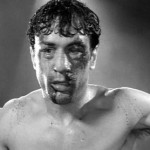Almost 50 years to the date, a month after arriving in New York to study sociology and film at Columbia University, I saw a young, insecure, unknown director, named Martin Scorsese, introducing his film on stage at the N.Y. Film Festival.
Mean Streets (1973): Scorsese’s Third Film, Starring Harvey Keitel and DeNiro Announced the Arrival of Major Visionary Director
King of Comedy (1983): Scorsese’s Underestimated Movie
As directed by Scorsese, “King of Comedy” was misinterpreted by many film critics–the black comedy offers a pungent (ahead od its time) look at perverse obsession with celebrities.
Raging Bull (1980): Scorsese’s Masterpiece, Starring De Niro in his Second Oscar-Winning Performance with Joe Pesci, Cathy Moriarty (Torturro Uncredited) (Masterpieces of American Cinema)
In Raging Bull, Scorsese equates sexuality with brute force and erratic violence; it’s a vicious circle. Freud has called it the “Madonna-whore complex.” Prizefighter Jake LaMotta suffers such low self-esteem and insecure masculinity that he cannot respect a woman who would sleep with him, and is convinced that given the choice she would rather sleep with another man.
Mean Streets (1973): Scorsese’s Third Film, Starring Harvey Keitel and DeNiro, Announced the Arrival of a Major Talent, with David Proval, Amy Robinson, Richard Romanus, Cesare Danova, Most Influential (if not Commercial) Film of the 1970s
Emphasizing characterization rather than plot, Mean Streets assured Scorsese a central role in contemporary film history. Densely rich and angst-ridden, his films are rooted in his Italian-American-Catholic experience, confronting themes of sin, guilt and redemption in a fiercely contemporary yet universal fashion. His explorations of male camaraderie, violent behavior, and men's deep fear of women have left a significant imprint on the work of numerous directors.
King of Comedy, The (1983): Scorsese’s Misunderstood Satire about Fame and Fans is one of his Best Films, Starring De Niro, Jerry Lewis, Sandra Bernhard, Diahnne Abbott, Cameos by Scorsese Family (Mother, Father, and Scorsese Himself)
As written by Paul Zimmerman and directed by Scorsese, “King of Comedy” was misinterpreted by many film critics. At heart, the movie is a pungent black comedy about a showbiz hanger-on and loser who idolizes America's top TV comedian/talk show host and figures out a bizarre scheme to get on the program. Though timely and relevant, for some reason, the film was considered too mordant and “sick” by some viewers at the time, disregarding the tale's rather accurate (and scary) portrayal of what's the best‚Äîand quickest–way to achieve celebrity status in American society today.








